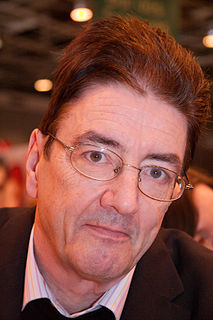A Quote by Georg C. Lichtenberg
It is said that truth comes from the mouths of fools and children: I wish every good mind which feels an inclination for satire would reflect that the finest satirist always has something of both in him.
Related Quotes
Art is created to make us, to make our passage through the world better, fruitful - and I would say that every story in the end, if it is good, tells us something. This is actually what I meant when I said a novelist is a teacher. Which is why I am constantly dealing with "didactic". Now a teacher in the sense I use it is not somebody who has the profession of standing in front of children, with a piece of chalk in his hand scribbling on the blackboard. That is not the teacher I have in mind. The teacher I have in mind is something less tangible.
Things that are good are good, and if one is responding to that goodness one is in contact with a truth from which one is getting something. The truth is doing us good. The truth of the sunshine, the truth of the rain, the truth of the fresh air, the truth of the wind in the trees, these are truths. And they are always accessible!
We humans are born egocentric. The sky thunders and children believe that God is mad at them for something they've done - parents divorce and children believe it's their fault for not being good enough. Growing up means putting aside our egocentricity for truth. Still, some people cling to this childish mind-set. As painful as their self-flagellation may be, they'd rather believe their crises are their fault so they can believe they have control. In doing so they make fools and false gods of themselves.
I was a knight," Andrea said. "I'm not just going to start shooting every dickhead who mouths off to me." "Just making sure." "Besides, if I shot him, I'd do it so nobody could trace it back to me. I'd shoot him somewhere remote, his head would explode like a melon, and they would never find his body. He would just vanish.
"So you're always honest," I said. "Aren't you?" "No," I told him. "I'm not." "Well, that's good to know, I guess." "I'm not saying I'm a liar," I told him. He raised his eyebrows. "That's not how I meant it, anyways." "How'd you mean it, then?" "I just...I don't always say what I feel." "Why not?" "Because the truth sometimes hurts," I said. "Yeah," he said. "So do lies, though."
It is said that ridicule is the test of truth; but it is never applied except when we wish to deceive ourselves - when if we cannot exclude the light, we would fain draw the curtain before it. The sneer springs out of the wish to deny; and wretched must that state of mind be, that wishes to take refuge in doubt.



































